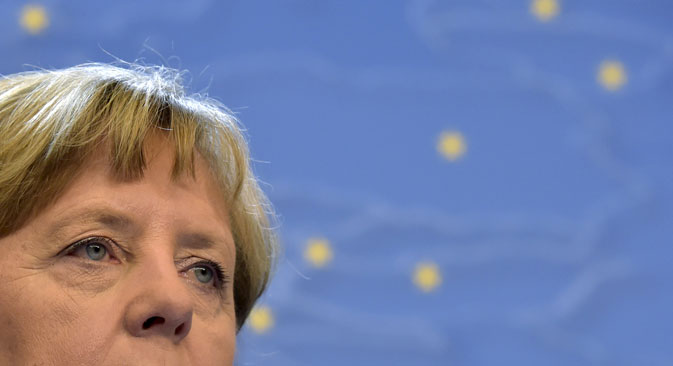
German Chancellor Angela Merkel explained that the sanctions introduced over the takeover of Crimea can be lifted only after “the annexation of the peninsula has been reversed.” Source: Reuters
The RBK business daily sums up the outcomes of last week’s EU summit in Brussels. As was expected, the EU has opted to link its sanctions against Russia to the implementation of the Minsk peace agreements signed on Feb. 12, aimed at a comprehensive settlement of the conflict in the Donbass region of eastern Ukraine. A separate provision of the resolution concerns the issue of Crimea. German Chancellor Angela Merkel explained that the sanctions introduced over the takeover of Crimea can be lifted only after “the annexation of the peninsula has been reversed,” the paper notes.
Another important issue on the summit agenda was energy. RBK recalls that in late February the European Commission submitted a draft plan for the creation of “a union similar to the European Coal and Steel Community.” The European Union supports the speedy development of a gas transportation infrastructure inside the EU, a revision of energy legislation and the creation of a more flexible energy market, the paper adds.
The EU also wants to make the implementation of contracts with outside energy suppliers, like Russia and Norway, more transparent. Since for Brussels energy security is now synonymous with the diversification of supplies, this may mean that Europe is ready to do everything to develop its partnership with other suppliers in order to reduce its dependence on Russian gas, RBK concludes.
The daily business newspaper Kommersant reports that one year since the Maidan revolution, a new phase in the struggle for the reallocation of power and resources is starting in Ukraine. At the heart of the controversy are Ukrainian President Petro Poroshenko and tycoon Ihor Kolomoisky, governor of the central city of Dnipropetrovsk. In the early hours last Friday, a raiding party headed by Kolomoisky arrived at the offices of UkrTransNafta, the company which controls the transportation of oil and petroleum products in the country.
Kolomoisky supports the suspended head of the company, Alexander Lazorko, whom the board of trustees of the holding company Naftogaz of Ukraine suspects of violations in favor of the Privat group owned by Kolomoisky.
Ihor Kolomoisky’s attempt to prevent the change of UkrTransNafta management by raiding the company’s offices was not a success. Poroshenko reprimanded the governor, which may mark the beginning of a confrontation between two pivotal figures in the country’s leadership, according to Kommersant. Experts view the incident of the replacement of the UkrTransNafta management as a first serious blow to the position of the powerful Dnipropetrovsk governor.
Reporting on the negotiations between the P5+1 group of six major powers (the U.S., Russia, China, the UK, and France, plus Germany) and Tehran on Iran’s nuclear program, the Nezavisimaya Gazeta centrist daily writes that although the parties are very close to a consensus on the nuclear issue, there are still some aspects that require discussion. The situation is further complicated by the particularly tough position being adopted by France.
“France wants a truly reliable agreement which guarantees that Iran will have access to nuclear power but not to an atomic bomb,” the paper quotes French Foreign Minister Laurent Fabius as saying. Nezavisimaya Gazeta goes on to explain that the U.S. wants the sanctions against Iran to be gradually lifted, whereas France is convinced that the sanctions should remain in force for longer.
In addition, Paris and Washington disagree on the duration of the comprehensive agreement. France insists that Iran should remain under the control of the International Atomic Energy Agency (IAEA) for at least 15 years, while the U.S. is in favor of a period of 10 years.
“France adopted this tough stance quite recently and it is rather hard to understand what caused it. One could venture a guess that the French are aligning themselves with Israel or with Obama’s opponents, the Republican Party,” says a senior research associate with the Russian Academy of Sciences’ Institute of Oriental Studies, Prof. Vladimir Sazhin. He adds that the lifting of sanctions against Iran will change the overall situation in the Middle East, while the country’s political and economic status will rise considerably.
All rights reserved by Rossiyskaya Gazeta.
Subscribe
to our newsletter!
Get the week's best stories straight to your inbox